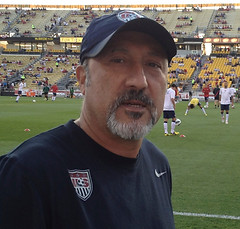
Parents Responsibilities to Players
and the Soccer Program
-
Paying attention to their child or teen’s feelings, moods, and responding to their needs regarding the sport. A sports program is not a babysitting service, and parents must continue to be involved in their child or teen’s life. A parent is much better trained than a coach to identify warning signs that the athlete is not happy playing soccer.
-
Helping their child or teen comply with team rules. Young athletes are not always able to comply with team or program rules without the help of parents. They may need equipment to be purchased, checks to be written, or immunizations to be scheduled. Parents are responsible for clearing the administrative hurdles so their child or teen can participate in the sport and be fully compliant with team rules.
-
Ensuring the athlete arrives on time and with necessary equipment. Unless an athlete has a driver’s license and a vehicle, they cannot really control their tardiness to practices and competitions. Parents are responsible for getting their child or teen to and from practices and competitions in the time stated, and with the right equipment. This doesn’t mean that parents have to personally provide transportation for their child, but it does mean arranging for transportation and ensuring that all people involved know what is going to happen.
-
Supporting the team or program through participation in fundraising, volunteering, or other capacities as needed. Being the parent of an athlete usually means more than just paying dues at the beginning of a season and watching your child progress. It also requires participation with other parents. These jobs could include ticket sales for events, working the concession stand, securing sponsorships from local businesses, or coordinating the purchase of team equipment. Parents should consider their personal and professional strengths and lend a hand where they are most able to help.
-
Giving their child the opportunity to advance in the sport. Parents who assist their children in learning more and practicing more have athletes who go farther in the sport. Parents should make every effort to help their child or teen advance by making it possible for them to practice outside of designated practice time, buying them practice equipment if possible, and introducing them to other kids also wanting to play soccer. The more opportunities an athlete has to learn and grow, the better they will become at their sport.Find and stay with a good, knowledgeable coach even if your kids does not start the game.
-
Providing a positive, loving support system for the athlete. Athletes thrive in positive, healthy environments. Parents have a responsibility to support their child or teen’s involvement in the sport by showing up for events, cheering on the athlete, helping them accept losses, and learning to appreciate success. Parents are a critical part of an athlete’s personal development, so parents must recognize the importance of their presence and positive attitude.
Contact
I'm always looking for new and exciting opportunities. Let's connect.
123-456-7890